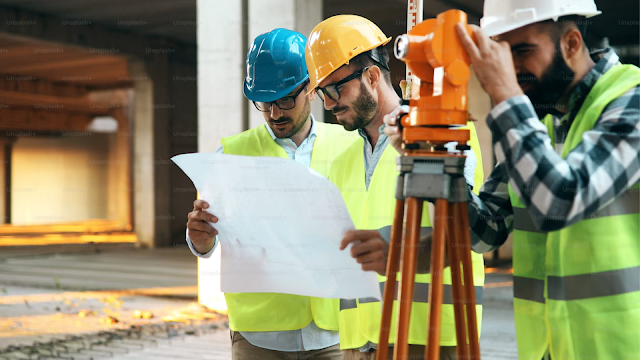Your Guide To Finding The Best Land Surveyor Near You
Introduction to Land Surveying
Land surveying is like mapping out a treasure. It's about
finding land's boundaries and understanding its features. This is vital when
you want to build, sell land, or settle disagreements. It's about where one
person's property ends and another's begins. However, finding the right person
to do this job isn't easy. You need someone with the right skills. They should
have experience and knowledge to fit your project's needs. This guide will help
you figure out how to choose the best land surveyor for your project.
1. What Does Your Project Need?
First, think about what your project is all about. Are you
trying to figure out where your land ends and begins, planning to build
something, or solving a land disagreement? Different projects need different
kinds of surveys. Knowing exactly what you need helps you find a surveyor who's
the best fit for your project.
2. Ask Around for Recommendations
Personal and professional recommendations are very powerful.
They are key in finding a qualified land surveyor. Start by tapping into your
personal and professional networks. Engage friends, family, or colleagues who
have recently undertaken similar projects. Their experiences and
recommendations can provide invaluable insights. Similarly, professionals in
real estate, law, and architecture often have trusted networks of surveyors.
They respect the surveyors' work and can recommend them. Such referrals come
with trustworthiness and competence. They offer a solid start for your search.
3. Utilizing Online Resources and Professional Associations
Today, in the digital age, online resources and professional
associations are vital tools. They help in identifying and vetting potential
land surveyors. Professional bodies, such as the National Society of
Professional Surveyors (NSPS) and state-specific associations, maintain
directories of licensed and certified professionals. These resources can be
vital. They ensure that your choices are not only qualified but also recognized
by their peers for their professionalism and expertise. Also, online platforms
like Angie’s List, Yelp, and Google Reviews have many user-generated reviews.
They give a broad view of the reputation and service quality of potential
surveyors.
4. Verifying Licenses and Certifications
You must verify a land surveyor's professional licenses and
certifications. This is a key step in selecting one. Licensing ensures the
surveyor has met your state's tough education, experience, and exam criteria.
Most states offer online tools to verify a surveyor’s licensing status. A
license is the foundation requirement. Extra certifications show a surveyor's
commitment to ongoing education. They also show their specialization in certain
surveying practices. Such credentials offer an added layer of confidence in
their ability to handle the specific demands of your project.
5. Assessing Experience and Specialization
The complexity and specificity of your project require a
surveyor with a proven track record of similar successful projects. Experience
in your project’s specific type of survey is crucial, as it ensures the
surveyor is well-versed in the challenges and intricacies it may present.
Furthermore, many surveyors specialize in particular types of surveys. Finding
a surveyor with the right expertise can greatly improve the surveying process.
6. Evaluating Professionalism and Communication
Professionalism and effective communication are key
attributes of a reliable land surveyor. At first meetings or calls, you can
assess these qualities. These interactions offer insights into the surveyor's
approach to projects. They show their willingness to listen and address your
concerns. They also show their ability to clearly explain their surveying
processes and methods. A surveyor who demonstrates a strong professional
demeanor and open, clear communication lines is more likely to ensure a smooth,
collaborative working relationship.
7. Understanding Fees and Service Inclusions
Transparency and clarity in fee structures and service
inclusions are critical in selecting a land surveyor. Requesting detailed
quotes from multiple surveyors allows for an informed comparison of costs
versus services offered. It's essential to understand exactly what is included
in the fee quoted and to inquire about any potential additional costs that may
arise. This step prevents unexpected expenses and ensures that the services
provided align with the needs of your project.
8. Reviewing Past Work and References
A surveyor's past work and client references are invaluable.
They help in assessing if they are suitable for your project. Ask for examples
of similar previous projects. They can show their technical skills, attention
to detail, and project management. Also, talking to past clients provides a
direct line to feedback on their experience with the surveyor. This includes
their satisfaction with the work's quality. Also, their view of the surveyor's
reliability and professionalism.
9. Investigating Reviews and Testimonials
Online presence is everywhere now. A surveyor's online
reviews and testimonials are powerful. They show their reputation and how
satisfied their clients are. Reviewing feedback from past clients can show how
reliable, how good at work, and how professional the surveyor is. Positive
reviews and testimonials can greatly influence your decision. They provide
reassurance of the surveyor's skills and their fit for your project.
10. Making an Informed Decision
With all information at hand, the final step involves a
comprehensive evaluation of your options. Consider the qualifications,
experience, proposed costs, and your personal interactions with each surveyor.
This whole approach ensures your decision is based not just on technical
skills. It's also based on the surveyor's fit with the unique needs of your
project. Trusting your instincts is key; opt for a surveyor who instills
confidence and with whom you feel a strong professional rapport.
Conclusion: Selecting the Right Surveyor—A Partnership for Success
Picking the right land surveyor is a big decision.
They're not just someone you hire; they're your partner in making sure your
project goes well. This guide should help you feel more confident in making
your choice. Remember, a good surveyor can make a big difference in how
successful your project is.


Comments
Post a Comment